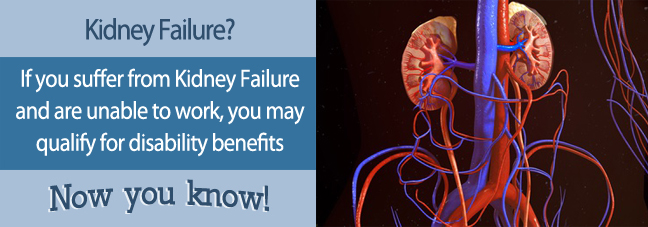The Social Security Administration (SSA) defines a functional limitation as an impairment which restricts a person’s ability to function in a way that limits them from participating in a normal range of activities due to kidney failure.
According to the SSA a functional limitation is also when a person is unable to work due to the limitations caused by kidney failure as well as being able to handle routine activities related to everyday life.
The symptoms of kidney failure may include:
- A decrease in urine output;
- irregular heartbeat;
- in a state of confusion;
- fluid retention, which leads to swelling of the ankles, legs or feet;
- feeling nauseous;
- pain or pressure on the chest;
- weakness.
Qualifying For Disability Benefits With a Functional Limitation
Because kidney failure has so many severe symptoms, taking up employment may be just about impossible. To qualify with for social security disability benefits with kidney failure you are required to meet a listing in the Blue Book.
For kidney failure the blue book list includes stays in hospital and requiring dialysis as conditions to be eligible for social security disability benefits. If you find you do not quite match the requirements in the Blue Book for kidney failure you may still be considered for a medical vocational allowance.
In order to qualify for a medical vocational allowance, you will need to show that your kidney failure has left you with functional limitations that prevent you from engaging in your usual work and any other possible work which may offer a living wage.

What to Expect When Applying For SSD with a Medical Vocational Allowance
If you decide to file a claim for a medical vocational allowance the SSA will ask you to get your physician to perform a residual functional capacity test (RFC). The results of this test show what you can and can’t do with your kidney failure.
The test assesses your capability both mentally and physically and includes lifting a heavy weight like 50 lbs, how long you can stand still in one place without having to sit down and whether you can bend your torso.
The SSA will also ask for your most recent medical records including treatment successes and will decide if your kidney failure is likely to last for at least 12 months. It will also make a decision if there is any job you can do while suffering from kidney failure.
Next Steps to Take
When filing your SSD claim you will need to provide as much evidence you can to prove your kidney failure. This includes:
- a formal diagnosis by your doctor and treatment and likely future outcomes;
- recent urinalysis results related to serum creatinine and albumen;
- imaging scans that show renal defects;
- renal biopsy results and results of surgery.
Talk to a Disability Attorney
The SSA doesn’t grant a benefit easily but with the help of a disability attorney you have a higher chance of being awarded a disability benefit or a medical vocational allowance.
Additional Resources
Applying for Disability Benefits for Kidney Failure When Over Age 50
Kidney Transplant and Disability Benefits